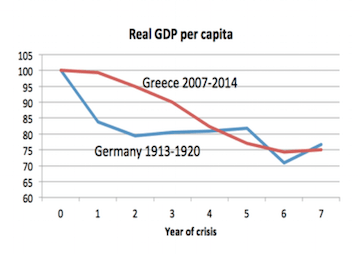Greece’s Economy Looks Like Germany’s After World War I
“Austerity”—the redirection of funds away from government and public services and toward a country’s creditors—“has devastated Greece just about as much as defeat in total war devastated imperial Germany,” economist Paul Krugman writes in The New York Times. The productivity per person in Greece's economy is almost exactly the same as that in Germany's economy after World War I. (Maddison Project, Eurostat)
The productivity per person in Greece's economy is almost exactly the same as that in Germany's economy after World War I. (Maddison Project, Eurostat)
“Austerity”—the redirection of funds away from government and public services and toward a country’s creditors—“has devastated Greece just about as much as defeat in total war devastated imperial Germany,” economist Paul Krugman writes in The New York Times.
To demonstrate this claim, Krugman compares the shrinkage of Greece’s gross domestic product seven years after the beginning of its austerity policies to that of Germany after its defeat in World War I. The similarities are visible in the graph above.
Aside from bringing to our attention the frightening similarity of the financial state of contemporary Greece to conditions that helped give rise to Hitler, why is Krugman telling us this? Because despite Greece’s already precarious position, the idea has been floated that the country should make efforts to “triple the size of its primary [budget] surplus,” through budget cuts or tax hikes, Krugman says. In other words, Greece’s troika of creditors—the European Commission, the International Monetary Fund and the European Central Bank—wants the nation to triple the amount of money that remains in its government accounts after spending on programs and before paying interest on debts.
That officials could expect Greece to do that is, Krugman, says, “disturbing.”
— Posted by Alexander Reed Kelly.
Your support matters…Independent journalism is under threat and overshadowed by heavily funded mainstream media.
You can help level the playing field. Become a member.
Your tax-deductible contribution keeps us digging beneath the headlines to give you thought-provoking, investigative reporting and analysis that unearths what's really happening- without compromise.
Give today to support our courageous, independent journalists.





You need to be a supporter to comment.
There are currently no responses to this article.
Be the first to respond.